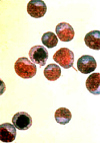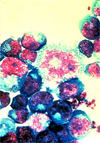How HIV Causes AIDS
HIV destroys CD4 positive (CD4+) T cells, which are white blood cells crucial to maintaining the function of the human immune system. As HIV attacks these cells, the person infected with the virus is less equipped to fight off infection and disease, ultimately resulting in the development of AIDS.
Most people who are infected with HIV can carry the virus for years before developing any serious symptoms. But over time, HIV levels increase in the blood while the number of CD4+ T cells decline. Antiretroviral medicines can help reduce the amount of virus in the body, preserve CD4+ T cells and dramatically slow the destruction of the immune system.
 |
 |
Normal T-cells
Credit: NIAID. |
HIV-infected T-cells
Credit: NIAID. |
People who are not infected with HIV and generally are in good health have roughly 800 to 1,200 CD4+ T cells per cubic millimeter (mm3) of blood. Some people who have been diagnosed with AIDS have fewer than 50 CD4+ T cells in their entire body.
Learn More